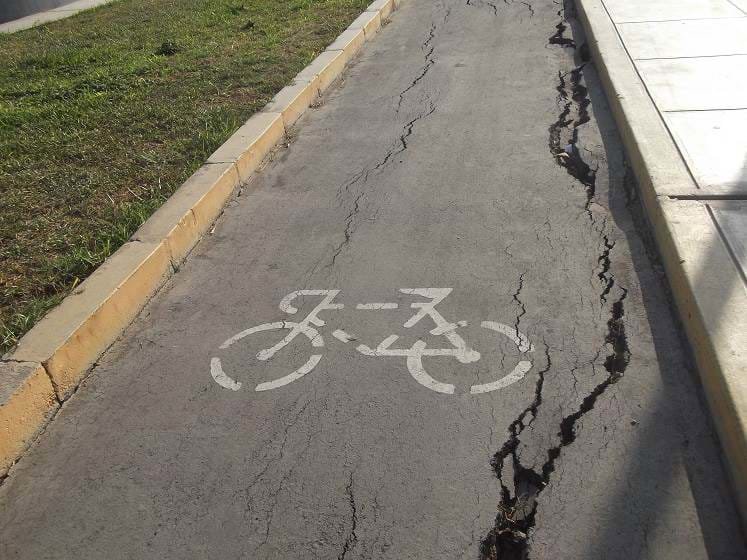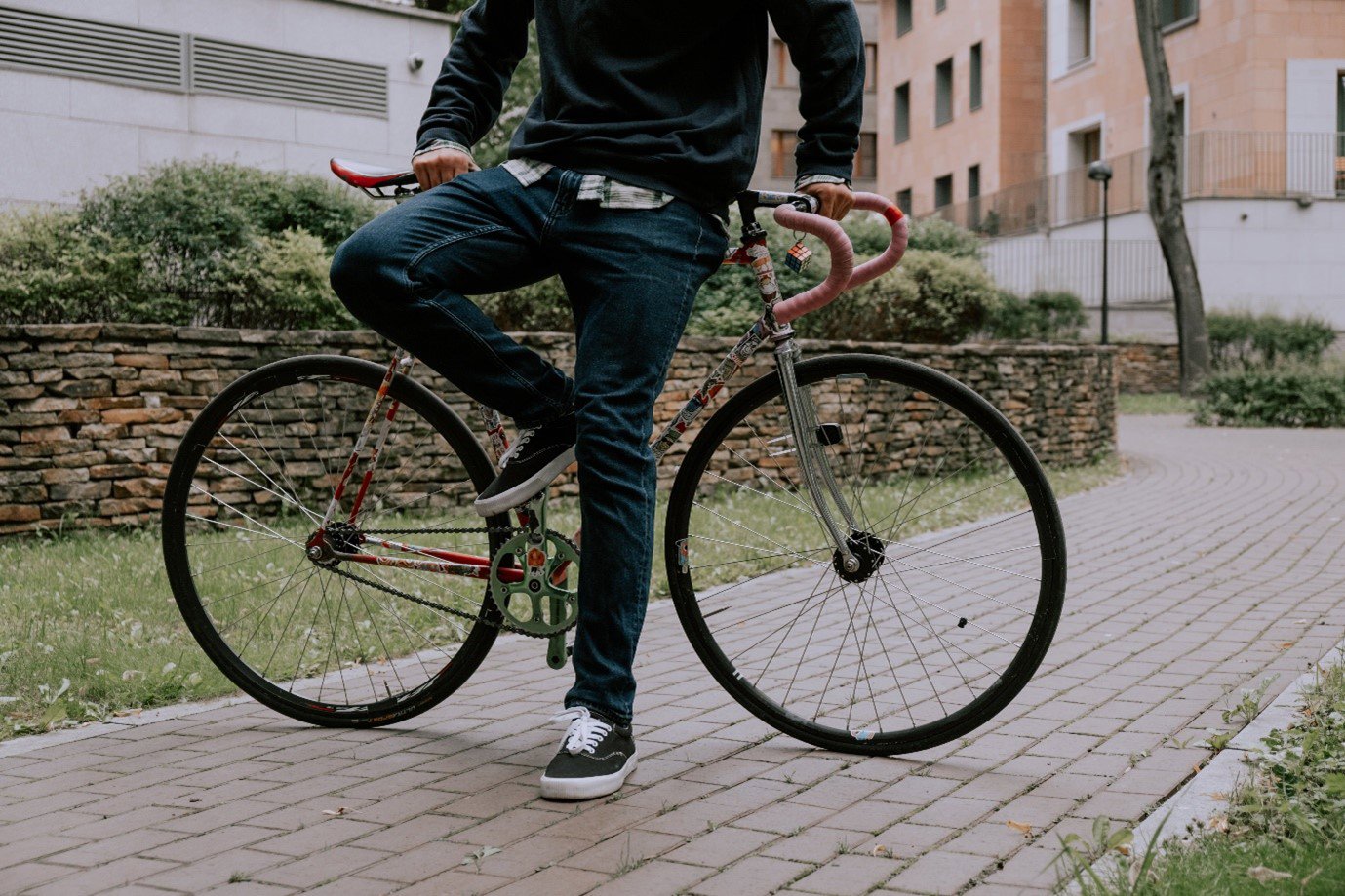Are UK Roads Safe to Cycle On?
Since the increase in cycling accidents we’ve seen recently, a lot of people are questioning whether UK roads are safe for cyclists. Many cyclists are worried about road safety however, local councils have now started to sign off roadworks to make roads in their area safer and more accessible for cyclists. This means creating cycle paths and widening roads to ensure that, if cyclists cannot have their own lane, they can at least safely join the flow of traffic.
As these roadworks and safety measures continue to happen, we will hopefully see a decrease in the number of cycling accidents.
Cyclist v Pothole - Who Wins?
Unfortunately, despite the roadworks happening to improve more built-up and urban areas, a lot of countryside roads still suffer with potholes. These can be bad enough for the unsuspecting motorist, but for a cyclist, a pothole can be even more dangerous.
Potholes cause people to lose control of their vehicle or bike, especially when they aren’t expected. As well as this, they can also cause damage to a bicycle tyre and frame, as well as leaving the cyclist with injuries which could affect them for the rest of their lives.
What Are the Dangers of Potholes for Cyclists?
Potholes can cause serious cycling accidents. For example, cyclists may lose control of their bike and get thrown off after hitting a pothole. When this happens, the council may have breached their statutory duty to ensure the highway is well maintained and safe for use by cyclists and motorists alike.
If this has happened to you, it’s worth seeing if you can claim compensation for the injury and damage you could have avoided if the pothole hadn’t of been there.

The Most and Least Safe Cities for Cyclists in UK
Some cities in the UK are regarded as being very safe for cyclists they are equipped with cycling paths and lanes. These cities have the lowest rates of cycling accidents.
But, unfortunately, other cities are not as well-equipped for cyclists, and as such have higher rates of cycling accidents.
In 2022, the safest cities for cyclists in the UK were found to be:
- Chelmsford
- Worcester
- Nottingham
- Lincoln
- Gloucester
- Cambridge
- Leicester
- York
- Wakefield
- St Albans
- Norwich
In the same report, the least safe cities for cyclists in the UK were found to be:
- Birmingham
- Newcastle
- Plymouth
- Sheffield
- London
- Preston
- Manchester
- Stoke-On-Trent
- Bristol
- Brighton & Hove
Simpson Millar’s Research on Cycling Accidents
In 2023, we conducted research on cycling accidents and the opinions of cyclists in the UK about where they feel safe and their general feelings and opinions around cycling accidents.
We found that overall, there is a lot of progress to be made to ensure that cyclists feel safe on the roads, perhaps due to the number of cyclists who have been in an accident (44%).
But, we also found that there are particular cities, as explained above, in which people feel considerably safer when cycling. It would therefore appear that, although more work needs to be done in this area, there have nevertheless been improvements.
The Most Common Types of Cycling Injuries
There are many different types of injuries that can arise from being in a cycling accident. These include:
- Lower back pain: Cycling alone can lead to lower back pain, and this can be made worse by the impact of an accident.
- Knee, wrist and ankle pain: This can be caused by the impact of being hit and/or falling from the bike. Fractures: As above, the impact of being hit or the impact of hitting the ground after falling from the bike can cause injuries of this type.
What To Do if You’re Involved in a Cycling Accident?
If you’ve been involved in a cycling accident, the best course of action is for you to firstly get the treatment you need as your health should take priority over everything else.
Once this step is complete, you could consider claiming compensation for the injuries you sustained as a result of the accident, particularly if you believe someone is at fault. If you decide that you would like to make a cycling accident claim, please get in touch with our friendly and approachable team of experts who will walk you through your options and discuss if we are able to take on your claim.
Why Claim Compensation?
Claiming compensation for your cycling accident could benefit you in a number of ways
Firstly, you may need some form of specialist treatment, rehabilitation or care depending on the severity of your injuries, and the compensation you will receive if successful in your claim will help cover this.
In addition, by making a claim, you will be helping to raise awareness of important issues, which in turn may lead to them being addressed and made safe for others.
If you are looking to claim compensation, at Simpson Millar, we can offer legal advice and assistance along the way.
How Does the Cycling Accident Claims Process Work?
So, you may be wondering how all this works. If this is the case, you’re in the right place. We’ll walk you through the steps of making a compensation claim for your cycling accident.
- Free Claims Assessment: We can help assess your case, for free, to help you figure out if you can claim compensation.
- Investigate your Claim: If we take on your case, we’ll begin to collect the evidence to further investigate and support your claim.Submitting your claim to the Responsible Party: We will contact the party responsible for your accident and provide details of your accident to them.
- Medical Assessment: We’ll get an independent medical professional to assess you and document the injuries you sustained as a result of the accident.
- Valuing your Claim: Once we’ve checked through everything, we’ll let you know how much compensation you can expect to receive.
- Settling on an Amount: We’ll try and reach a settlement outside of Court, but if your claim has to be settled in Court, we’ll make sure to keep supporting you and keep you updated every step of the way.
How Much Compensation Could I Receive?
The amount of compensation you could receive depends on several different factors:
- The severity of the injuries caused
- The treatment of your injuries and how much this could cost
This is why it’s so important to get a legal professional involved, so you accurately know how much your claim is worth. This way, you won’t settle on less than you deserve.
How Will I Fund my Cycling Compensation Claim?
When we take on your case, we’ll let you know your options in terms of funding your traffic accident claim.
This way, you’ll be able to understand how much the process is going to cost, and the options available to help you afford this.
We understand how important it is for you to be able to financially plan for this, which is why we’ll always keep you updated in terms of the financial and costing side of the process.
Do You Need to Go To Court?
It’s important to note that most of the time, it is ideal if claims are settled outside of Court.
This is to make sure that no one has to go through the stress of court proceedings that may not be necessary. In addition, the Court system is overwhelmed with lots of cases and so settling your claim outside of court will often result in a more timely resolution of your claim.
Therefore, to help take some of the strain off the Court system, at Simpson Millar, we try and make sure that things are settled outside of Court where possible.
Safety Tips for Cyclists to Help Avoid Future Biking Accidents
There are a few tips to help you avoid future biking accidents. These include:
- Wearing a proper, well-fitted bike helmet;
- Wear high-vis and reflective clothes at all times, to make sure people can see you;
- Keep a safe distance from other road users;
- Make sure your bike has a bell to let people know you’re there;
- Signal properly to make sure others know what you’re doing and when;
- Only cycle on designated cycle paths and on the road, instead of using pavements.
While many cycling accidents are of course difficult to avoid on the part of the cyclist, it’s always good to stay as safe as possible, so that if accidents do happen, you’re at least protected from being seriously injured.

When is Cycling Week 2024?
Bike Week 2024 falls on the 10th-16th June 2024. This week focuses on how cycling boosts productivity and improves wellbeing in the workplace.
In addition, the work emphasises how cycling to work helps to reduce emissions and congestion, thus helping the environment as well as your health.
What’s Being Done to Improve Cycling Safety?
As we’ve already touched on, councils are already taking steps to improve cycling safety.
From doing roadworks to widen the streets, installing cycle paths to improving traffic flow and reduce congestion and makingroads safer for all road users including cyclists, there’s a clear effort being made.
What Can Simpson Millar Do for Me if I’ve Been Involved in a Cycling Accident?
If you’ve unfortunately been the victim of a cycling accident, we understand that things will likely be difficult for you right now. Being in an accident can leave you with emotional scars as well as physical ones, which can be really tough to deal with.
That’s why we always approach these cases with the sensitivity and mindfulness they deserve, making sure our clients feel able to express their legal worries and concerns. We will support our clients through the whole process of claiming compensation, making sure they are kept informed and updated at all times.
FAQs for Cycling Accident Claims
Is there a time limit for making a claim?
It’s ideal to start making a claim as soon as you can when you’ve been in a cycling accident, but the maximum time limit is three years from the date of the accident.
What are the common causes of cycling accidents?
There are many causes of cycling accidents, but some of the common causes are drivers being unable to see cyclists, unsafe roads for cyclists, and distracted or impaired driving.
What if the driver who caused the accident doesn’t stop?
This unfortunately does happen sometimes – and if this is the case, you can still claim compensation through the Motor Insurers Bureau (MIB).
How long can it take to get the compensation?
It’s difficult to say, unfortunately, as compensation claims can take varying amounts of time, depending on the factors at play.
Why make a claim for compensation?
Claiming compensation means you’ll likely be able to receive the treatment, rehabilitation and care you need after the accident. In addition, speaking up and claiming can help raise awareness about cycling accidents and the issues that cause them.
Can I claim for a cycling accident caused by poor road conditions?
Yes; if you believe that poor road conditions such as potholes or an uneven road surface was the cause of your accident, we would encourage you to get in touch with us to discuss your options.Can I claim for a cycling accident caused by defective equipment?
Again, you may be able to claim for a cycling accident caused by defective equipment. With the right evidence to support the equipment failing to work correctly, a claim can be successful.
Can I make a No Win No Fee cycling accident claim?
You can make a No Win No Fee cycling accident claim, with our specialist team of legal experts at Simpson Millar.






